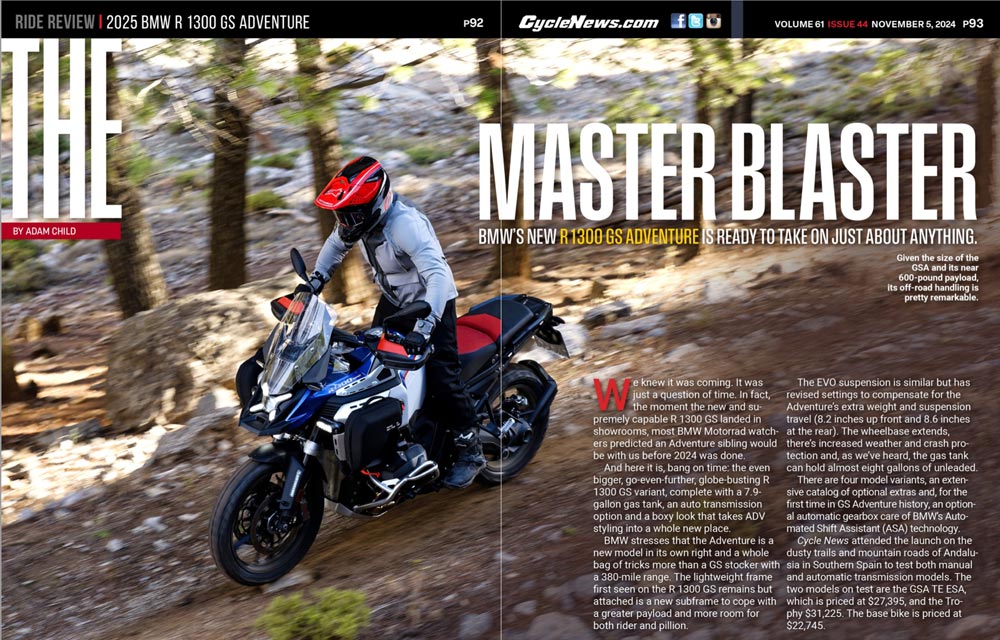| November 10, 2024
We knew it was coming. It was just a question of time. In fact, the moment the new and supremely capable R 1300 GS landed in showrooms, most BMW Motorrad watchers predicted an Adventure sibling would be with us before 2024 was done.
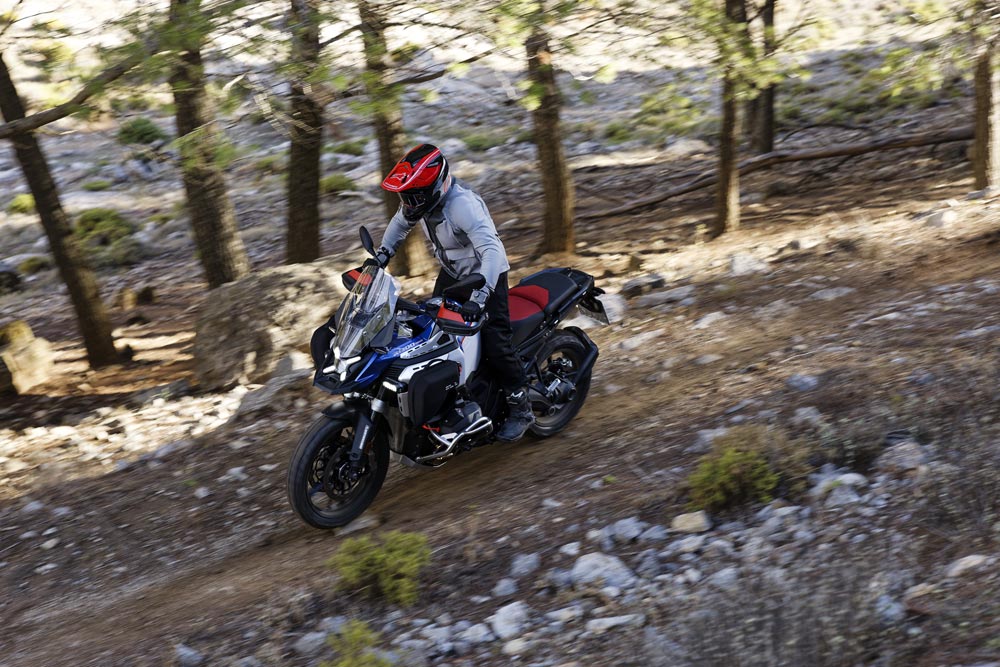 Given the size of the GSA and its near 600-pound payload, its off-road handling is pretty remarkable.
Given the size of the GSA and its near 600-pound payload, its off-road handling is pretty remarkable.
By Adam Child
And here it is, bang on time: the even bigger, go-even-further, globe-busting R 1300 GS variant, complete with a 7.9-gallon gas tank, an auto transmission option and a boxy look that takes ADV styling into a whole new place.
BMW stresses that the Adventure is a new model in its own right and a whole bag of tricks more than a GS stocker with a 380-mile range. The lightweight frame first seen on the R 1300 GS remains but attached is a new subframe to cope with a greater payload and more room for both rider and pillion.
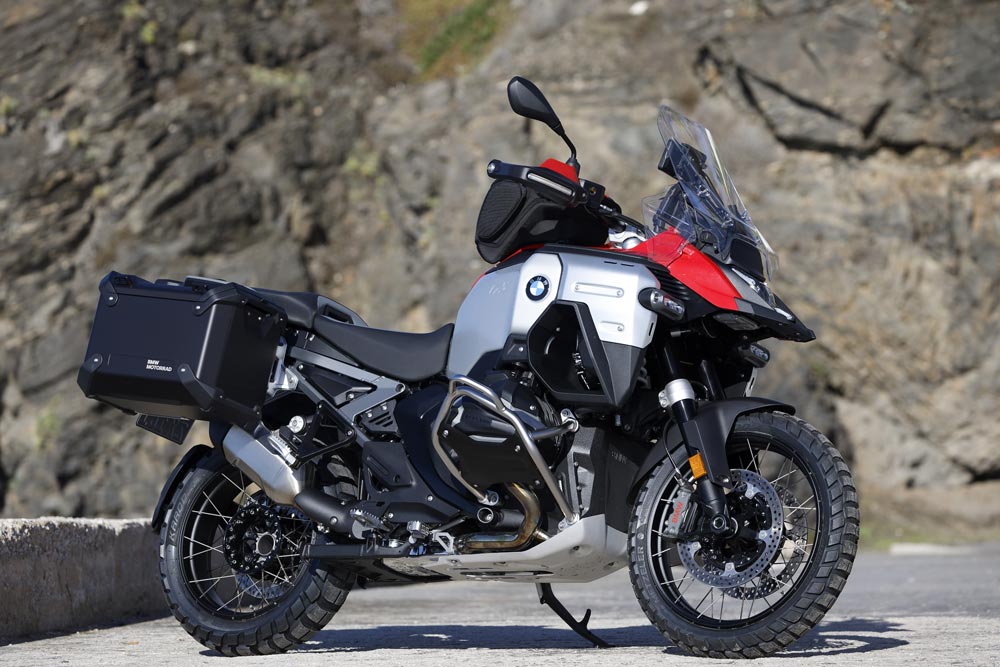 What a beast! Adventure bikes don’t come much bigger (or packed with almost every conceivable gizmo you can buy) than the new GSA.
What a beast! Adventure bikes don’t come much bigger (or packed with almost every conceivable gizmo you can buy) than the new GSA.
The EVO suspension is similar but has revised settings to compensate for the Adventure’s extra weight and suspension travel (8.2 inches up front and 8.6 inches at the rear). The wheelbase extends, there’s increased weather and crash protection and, as we’ve heard, the gas tank can hold almost eight gallons of unleaded.
There are four model variants, an extensive catalog of optional extras and, for the first time in GS Adventure history, an optional automatic gearbox care of BMW’s Automated Shift Assistant (ASA) technology.
Cycle News attended the launch on the dusty trails and mountain roads of Andalusia in Southern Spain to test both manual and automatic transmission models. The two models on test are the GSA TE ESA, which is priced at $27,395, and the Trophy $31,225. The base bike is priced at $22,745.
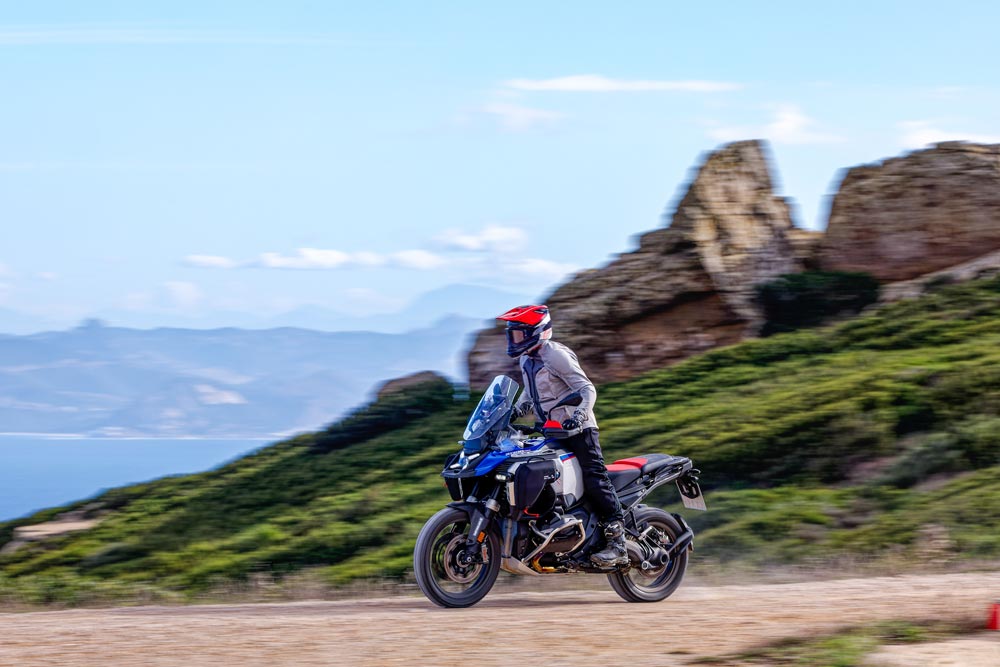
Riding the 2025 BMW R 1300 GS Adventure
First, those looks. Love them or loathe them, it’s clear BMW set out to put a clear visual difference between its two R 1300 GS models, and certainly you can no longer confuse the two, not even after a big night out. And if the stock GS is large, the Adventure is enormous; a mountain of a machine that, on first contact, comes across as slightly intimidating to a 5’7” rider like me.
BMW asked if I wanted the lower seat option fitted to our test machine, but I stuck with the standard unit, which ranges from 34.3-inch to 35-inch, 0.8-inch higher than the standard R 1300 GS. Throwing a leg over the full-height Trophy variant, complete with its even taller Enduro seat 35.2-inch/36-inch, revealed a massive motorcycle, especially with radiator-cowl side bags fitted.
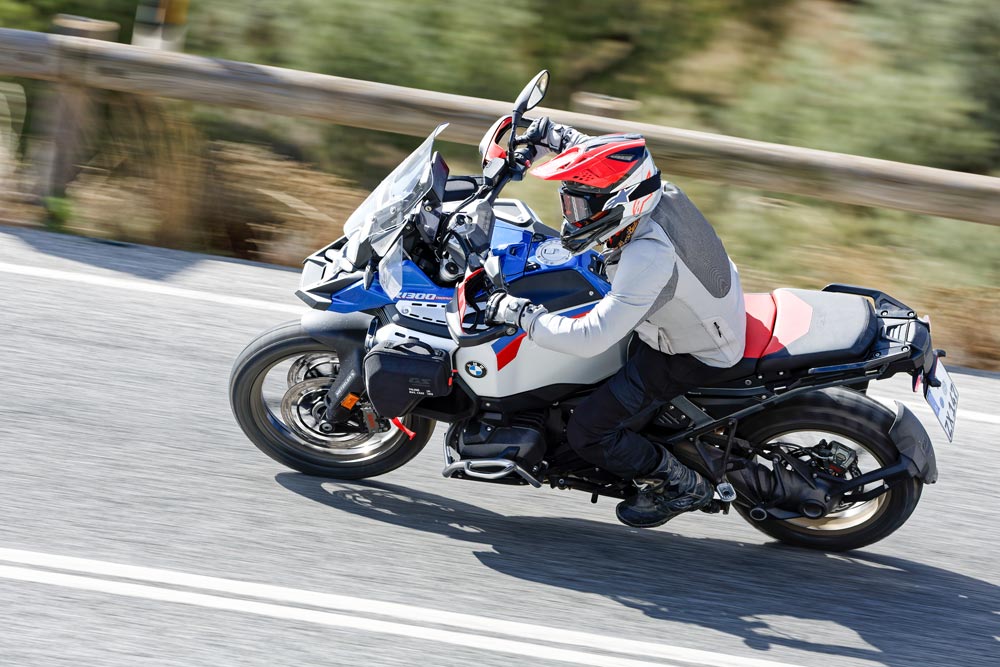
With the bike upright, I could get one foot securely down and was still able to reach the back brake or gear selector with the opposite foot. Add the optional adaptive vehicle height control, which automatically lowers the seat by another 1.2-inch on the standard seat height to 33.5-inch when the bike comes to a halt, and I was in the game.
Anyone who’s piloted a GS knows what comes next. Yes, you got it, as soon as the wheels are turning, the size and all that 593-pound bulk of the Adventure seem to evaporate. Like every GS boxer of the last two decades there is a game-changing and defining balance to the way it rolls. At slow speeds, even walking pace, its low center of mass and easy torque feed great dollops of confidence to nervous riders.
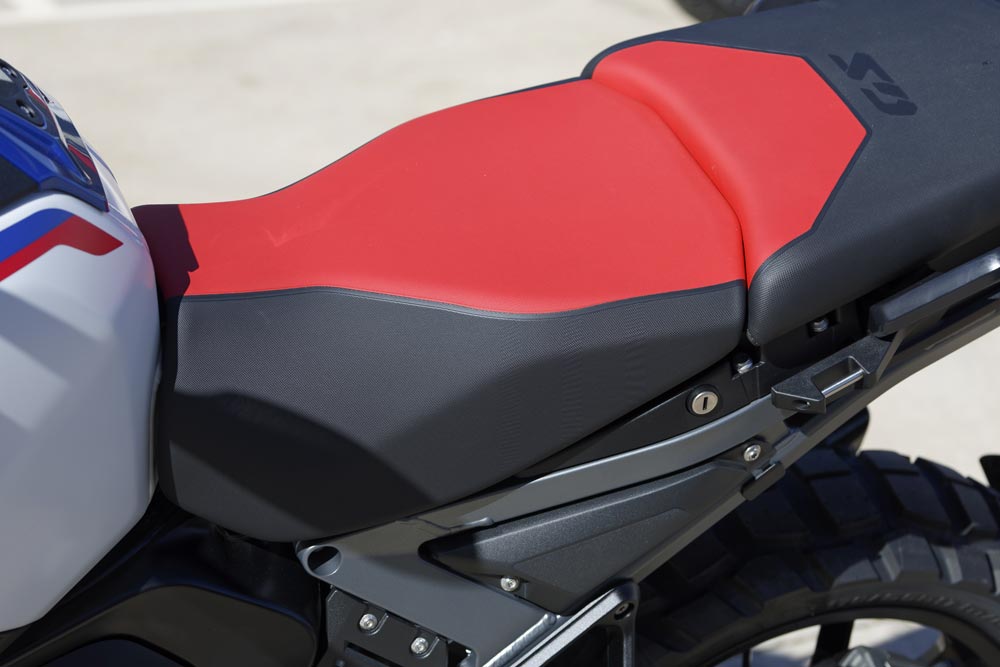 Flat ADV seat is perfect for off-road missions.
Flat ADV seat is perfect for off-road missions.
Those familiar with the GS will also know that the wide 6.5-inch TFT display and its navigation wheel on the left bar quickly become second nature to use. I still rate the GS dash and switchgear as the best on the market and thankfully BMW hasn’t changed this proven recipe on the 1300 Adventure.
As with the R 1300 GS, the screen is electronically adjustable, and both cruise control and Dynamic Suspension Adjustment (DSA) come as standard—in fact, there is no option for conventional, manually adjustable suspension on the Adventure. There are four standard riding modes and a raft of rider aids. After that, it’s just a question of how many boxes you ticked in the accessories pack.
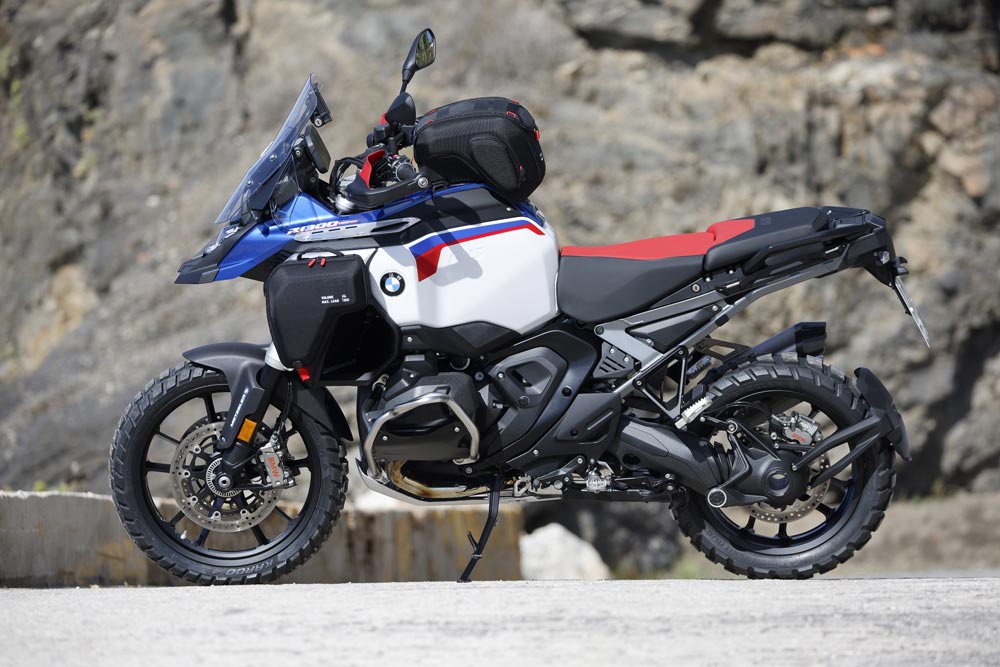 The GSA in Trophy colorway looks tough as nails.
The GSA in Trophy colorway looks tough as nails.
You can, for example, opt for up to seven riding modes by adding Dynamic, Dynamic Pro and Enduro Pro to the standard Eco, Road, Enduro and Rain. You could opt for the clever and easy-to-use Active Cruise Control (ACC), which incorporates Lane Change Warning and the Rear End Collision Warning (RECW). There are screen options, as well as multiple luggage and top case choices.
As mentioned, we had two bikes on test: the distinctive Trophy running a conventional gearbox and featuring the Style package ($845 for the paint scheme, sports screen, protective grille and rally seat); the Enduro package ($745 for more off-road focused rider ergonomics); forged Enduro wheels ($1095), Double Silencer ($1145). Meanwhile, our red and silver TE was equipped with the Premium Package ($3275), adaptive height control ($625), and the automatic gearbox ASA (included in Premium Pkg.). Both bikes were fitted with optional ($55) off-road biased Metzeler Karoo 4 rubber, (Michelin Anakee Adventure and Metzeler Tourance Next 2 also come as an option).
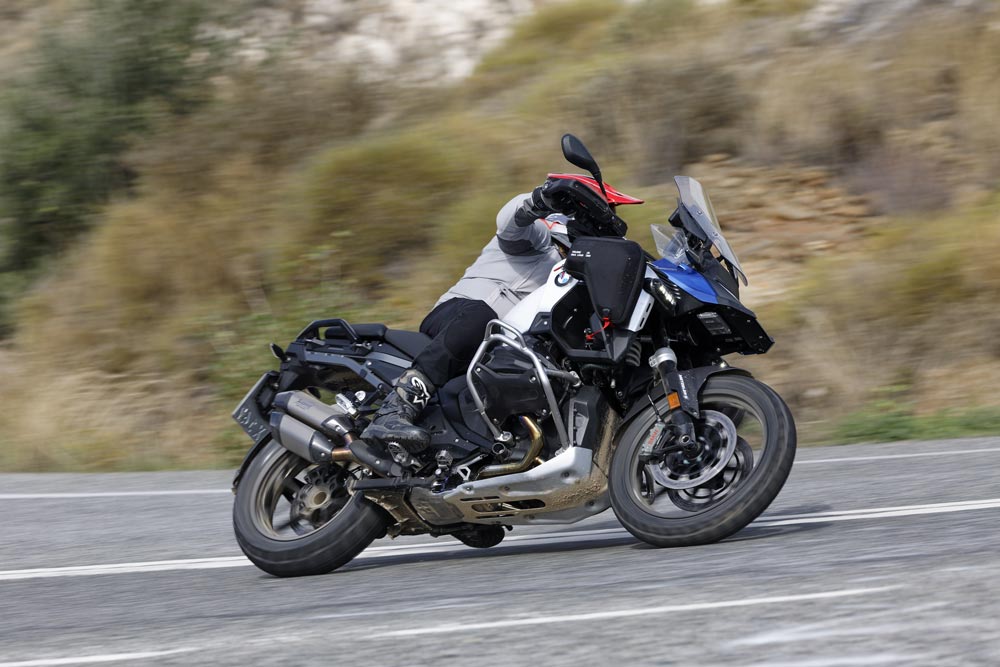 On-road performance has always been a strong point of the GSA and it’s just as good as before, which is even more impressive given the size and effort required to change direction.
On-road performance has always been a strong point of the GSA and it’s just as good as before, which is even more impressive given the size and effort required to change direction.
We couldn’t wait to hit the wide-open trails that are common to Andalusia. It’s a big ask to make such a beast work off-road, and that gas tank restricts your movement slightly when you are standing on the grippy off-road footpegs, but the chassis and suspension support and control the bike’s mass superbly. That sweet boxer balance means it will calmly navigate around obstacles at walking pace while the fueling in the off-road Enduro and Enduro Pro modes is precisely on point. Twenty minutes into our first foray onto the dirt, any sense of intimidation had been replaced a desire to explore whatever was out there in the Spanish wilderness.
As the pace picked up to 60 mph and more, the Adventure threw up curtains of dust on the long arcing turns corners while giving me great vison ahead. In the optional Enduro Pro mode you can play with the rider aids, reducing the traction control or removing in the ABS from the rear. Most riders will want the added security of the off-road biased rider aids as these are excellent at keeping everything in order while encouraging you to have fun. Aggressive throttle inputs send the rear Metzeler spinning, but there’s always control. Add more lean angle or counter steering and you’re rewarded with a progressive slide that looks as cool as it feels.
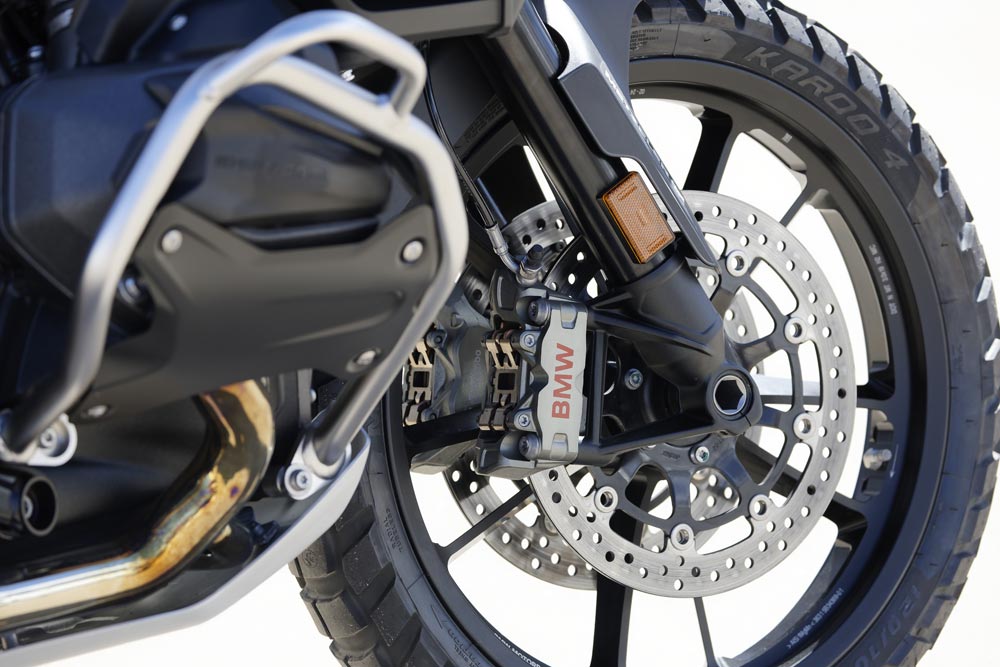 BMW calipers look trick, but if you look closely, you’ll see the Brembo writing on the back of the caliper.
BMW calipers look trick, but if you look closely, you’ll see the Brembo writing on the back of the caliper.
Get too carried away and the TC reduces the power and brings the wheels back in line. No bangs, pops or drama—just velvet smooth control. It’s the same story for the off-road ABS-assisted brakes, which manage to find grip where you didn’t think it existed. Stopping a 593-pound plus rider and extras from 60 mph on gravel and dust takes some doing, but the ABS is strong and reassuring as you feel the system working to find grip.
A note of warning, though. It is quite easy to forget that it’s not, in my case especially, natural talent making the Adventure pull off wide-open rooster-tailed power slides like an enduro ace—it is BMW’s electronics. Turn them off and it’s a wild ride indeed. Unless you are a regular enduro demon, you also feel that weight after a few hours on the ’pegs.
I also guess that anyone who rides a lightweight single-cylinder enduro will find the Adventure unwieldy and real dirt experts will find the ABS too intrusive, but as a road rider who likes weekends exploring the trails, I loved it. There is even comprehensive crash protection should you get a little carried away.
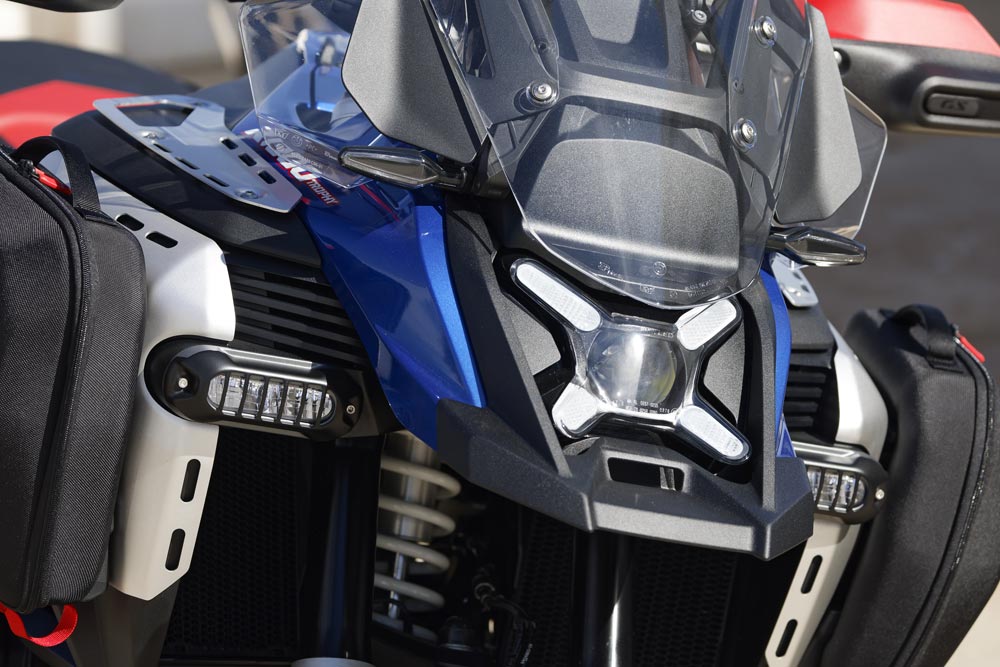 The unmissable face of the new GSA.
The unmissable face of the new GSA.
On the street, it’s no less potent as an adventure machine, but retains a typically GS sporting edge. In Road mode the ride quality prioritizes comfort over performance via the Dynamic Suspension Adjustment (DSA), giving a sumptuous ride that hardly seems to affect either the bike’s stability or effortless speed over the ground. We encountered surfaces so bad they were broken by tree roots that would send many bikes into grade A tank-slapper, but the implacable Adventure absorbed everything in its path, stability unchallenged.
When the pace picks up on the road, you can flick into the Dynamic or Dynamic Pro modes, which gives the Adventure more support and a tauter ride. There’s noticeably less suspension travel and more feedback from the rubber. Suddenly the Adventure is pushing on a bit: stable, accurate, calm and, yes, sporty.
The dirt-biased Karoo 4 rubber copes well on the road, but on occasion I could feel the tires move on their tread blocks and took that as a warning. All modern GSs are exceptional handlers but it’s asking a lot of a 19-inch front wheel when you dive deep into an apex, braking relatively hard.
The brilliance of the Adventure is the way it has been designed to be friendly and easy-going despite its mighty size, but with a full tank of gas, you do have to work for your fun. Hit a switchback section on a mountain road at speed, and your inputs become more physical and, while the Adventure can certainly hustle, doing so requires more effort than the standard GS. Even the brakes, which are essentially the same as those on the GS, have to work harder and feel less sharp as a result.
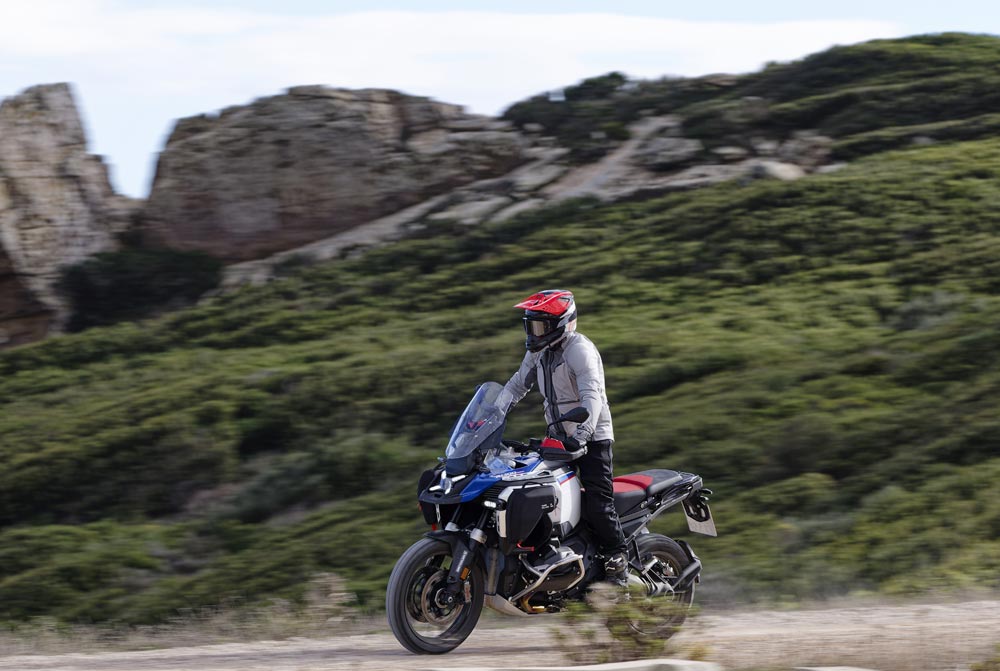 Lonely Spanish roads are all the more enjoyable on the behemoth GSA.
Lonely Spanish roads are all the more enjoyable on the behemoth GSA.
Like the brakes, boxer power is carried over from the R 1300 GS, giving a peak of 143hp and 110 lb-ft of torque. As noted, the fueling is immaculate and, even in Dynamic mode, the Adventure will pull keenly away with the throttle barely opened. Over two days of riding I don’t think I ever got close to the redline: there’s simply no need given the twin’s luxurious spread of torque.
On the second day, we rode from Tarifa on the southern-most tip of Spain back to Malága, with more off-road, as we hugged the coast with Africa in the distance. But soon the romance was over, and we had to churn out some big miles on the freeway. Comfort is relentlessly good for mile after painless mile, especially if you configure your Adventure with the larger screen, comfort seat and adaptive cruise control. BMW quotes a 380-mile range at a claimed 47.46 mpg USA, which is a long old stint between stops in anyone’s book. On test, I averaged just shy of 41.6 mpg, which considering the abuse the Adventure took off-road wasn’t bad at all.
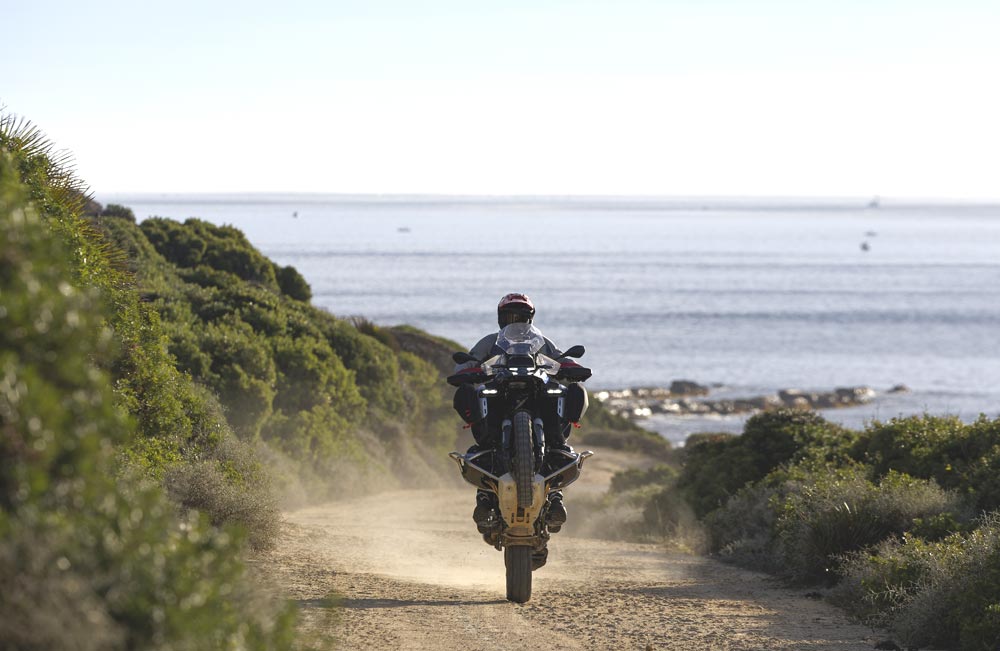 Who says the biggest bike on the trail can’t get it up?
Who says the biggest bike on the trail can’t get it up?
Verdict | 2025 BMW R 1300 GS Adventure Review
BMW like to go their own way and, once again, have succeeded with the R 1300 GS Adventure. The depth of thinking in its design and execution, in its useful features and vast range of accessories, is exceptional. It is like no other bike on the market. A 593-pound motorcycle shouldn’t work equally brilliantly both on and off-road, but this one does. It also has exquisite slow speed balance and perfect fueling plus a seat lowering device that makes this giant of a machine accessible to all. The hardest decision for many will be choosing which exact model variant to opt for and which packages and accessories boxes to tick.
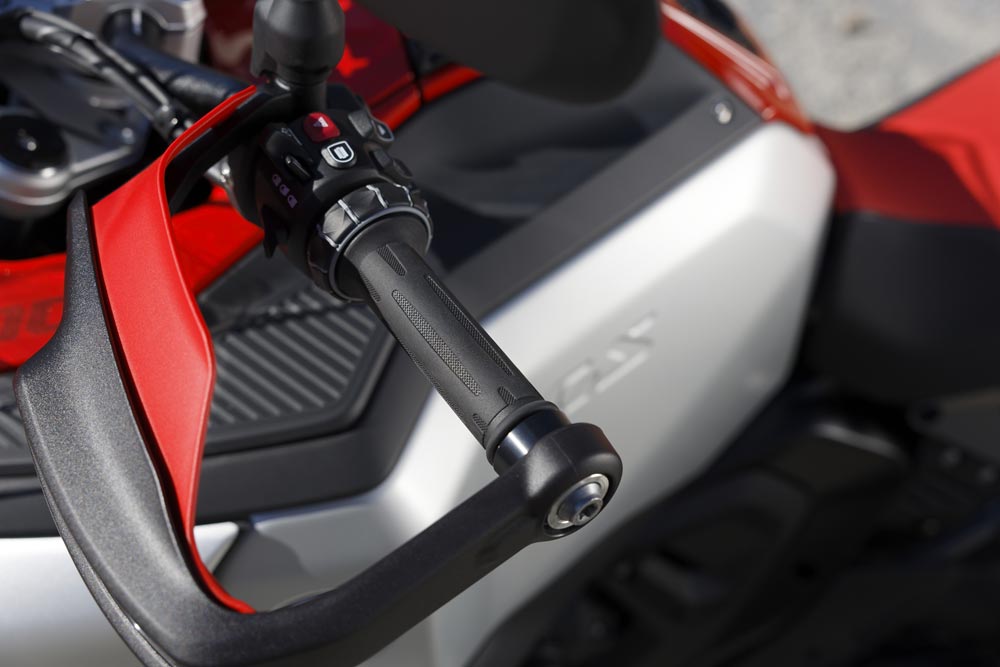
What about the auto shift?
With Automated Shift Assist (ASA), the transmission can change up and down gears without any rider input, depending on the mode selected. There is no conventional clutch lever or paddle shift on the handlebar, but you do have a conventional gear selector foot lever. ASA can also let you change gear conventionally with your left foot, but without the clutch, and can stop in gear. Alternatively, you can mix the two by riding with the automatic gearbox mode selected and, should you wish just cog it back a few gears or select a high gear, make the selection manually and do so without a clutch.
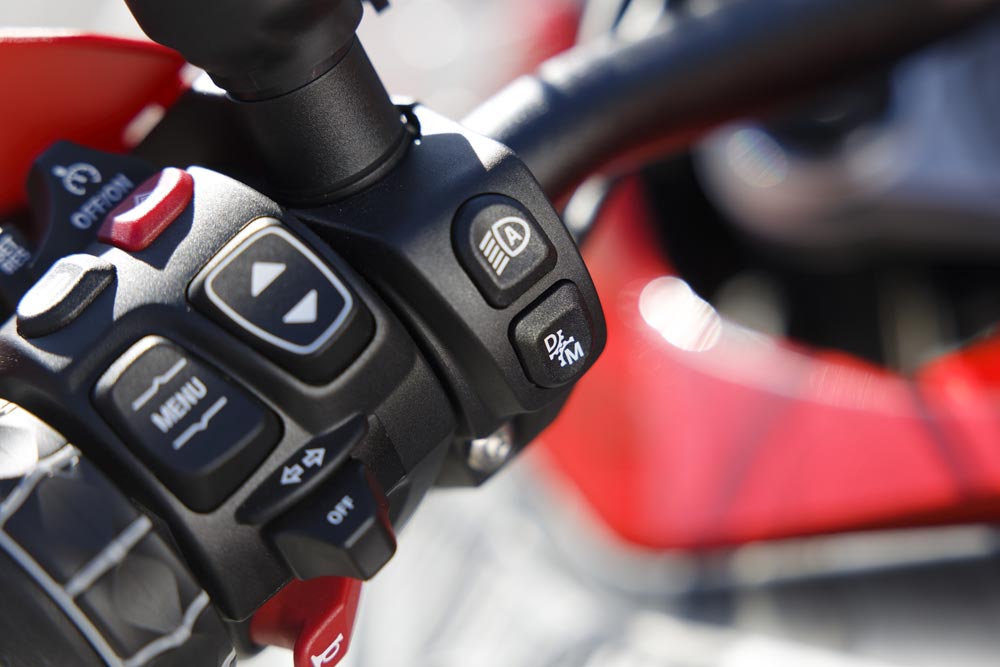
As with any new system, it takes a little getting used to. With the bike in P (Park), there’s no clutch. You just click into first gear and pull away, then change gear without a clutch or rely on the automatic system. When you come to a stop, there is no clutch lever to pull. Stopping and starting with a redundant left foot and hand is a little unusual but makes town riding effortless. In touring mode, it makes perfect sense: its smooth gear changes, combined with the bike’s soft suspension, making it even easier to ride for hours at a time.
I preferred the conventional transmission off-road and having the ability to balance on the bike during slow maneuvers and injecting a dash of power to loft the front at will. However, for the majority of potential buyers, ASA makes perfect sense for touring. CN
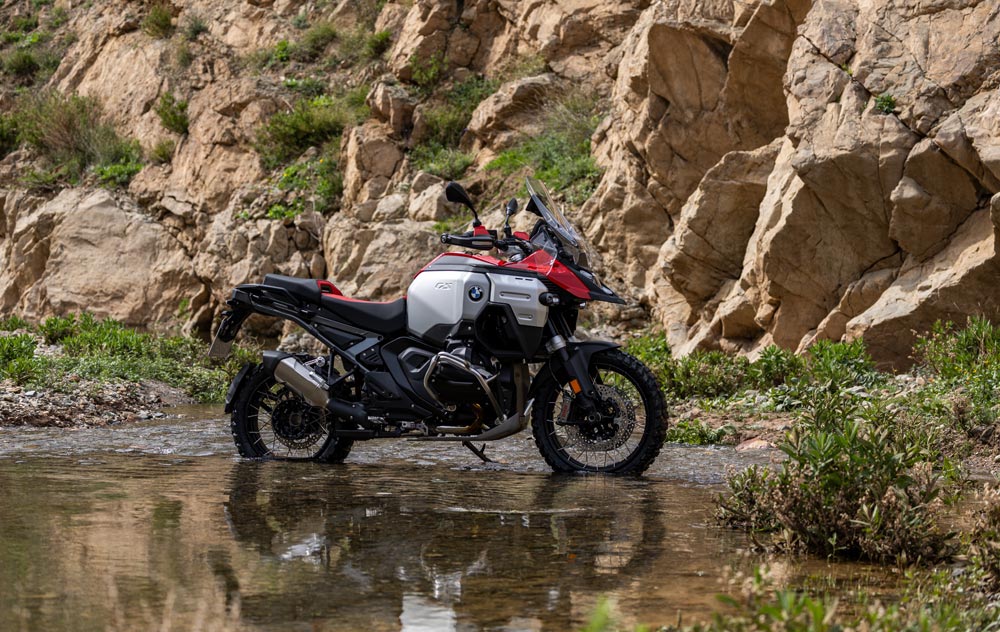
2025 BMW R 1300 GS Adventure Specifications
| MSRP |
$22,745 (base model) |
| Engine |
Boxer-twin, 4-stroke |
| Displacement |
1300cc |
| Valvetrain |
4 valves per cylinder, BMW ShiftCam assisted |
| Bore x stroke |
106 x 73mm |
| Compression Ratio |
13.3:1 |
| Fuel injection |
Electronic fuel injection system, 52mm throttle bodies, Ride-by-Wire throttle |
| Exhaust |
2-into-1 |
| Transmission |
6-speed—optional shift assist and semi-auto operation |
| Clutch |
Hydraulically activated wet slipper clutch |
| Chassis |
Pressed/welded sheet steel with tubular aluminium subframe |
| Front suspension |
EVO Telelever Electronic ESA fully adjustable |
| Rear suspension |
EVO Paralever Electronic ESA fully adjustable |
| Front-wheel travel |
8.2 in. |
| Rear-wheel travel |
8.6 in. |
| Front brake |
Dual 4-piston radial calipers, 310mm discs, Cornering ABS |
| Rear brake |
Twin-piston caliper, single 285mm disc, Cornering ABS |
| Front tire |
120790-19 in. |
| Rear tire |
170/60-17 in. |
| Rake |
26.2° |
| Wheelbase |
60.4 in. |
| Seat height |
34.3-35 in. |
| Fuel capacity |
7.9 gal. |
| Weight (curb, claimed) |
593 lbs. |
